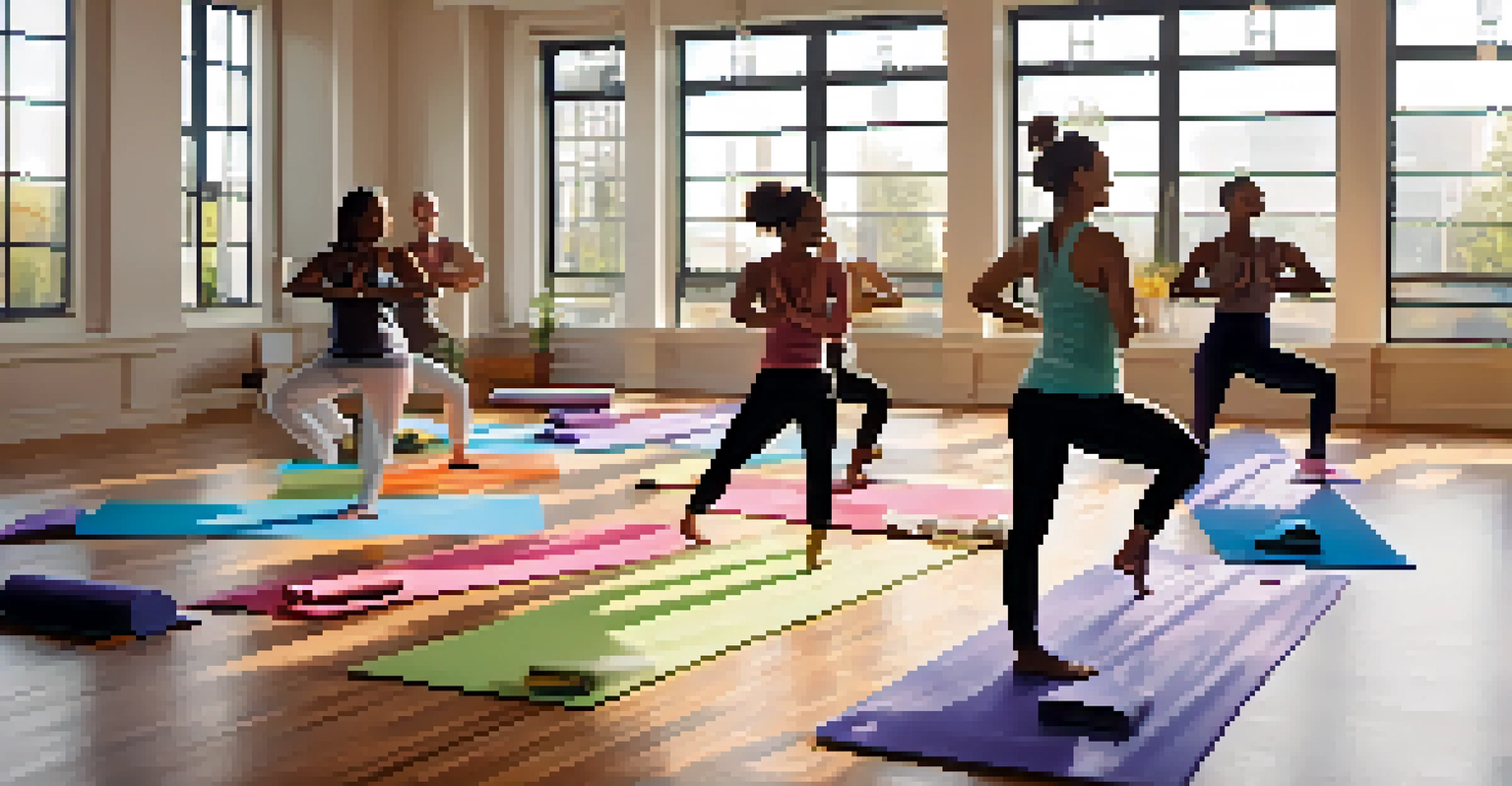The Role of Yoga in Mental Resilience for Athletes

Understanding Mental Resilience in Sports
Mental resilience refers to an athlete's ability to bounce back from challenges and setbacks. It’s not just about physical strength; it involves emotional and psychological stamina as well. In the high-stakes world of sports, where pressure can mount quickly, mental resilience becomes crucial for success.
The mind is everything. What you think you become.
Athletes often face intense competition, injuries, and even the weight of expectations from fans and coaches. Developing mental resilience helps them navigate these hurdles without losing focus or motivation. This psychological fortitude is essential, as it can often be the difference between winning and losing.
By enhancing their mental resilience, athletes are better equipped to handle stressors that come their way. This preparedness allows them to perform at their best, even under pressure, making it a vital component of athletic training.
The Practice of Yoga: A Holistic Approach
Yoga is more than just a physical workout; it is a holistic approach that integrates the mind, body, and spirit. This ancient practice encourages awareness, focus, and relaxation, all of which contribute to mental resilience. Through various poses and breathing techniques, athletes can cultivate a calm and centered mindset.

For athletes, yoga provides a unique opportunity to connect with their inner selves. Unlike traditional training methods, yoga emphasizes mental clarity and emotional balance, which are critical for peak performance. This connection can lead to increased self-awareness and improved concentration during competitions.
Mental Resilience is Essential in Sports
Athletes need mental resilience to overcome challenges like competition pressure and injuries, which can be the key to their success.
Moreover, the meditative aspects of yoga help athletes learn how to manage their thoughts and emotions effectively. This skill is invaluable when faced with high-pressure situations, allowing them to maintain composure and focus on their goals.
Breath Control: A Key Element of Yoga
One of the foundational elements of yoga is breath control, known as 'pranayama.' This practice teaches athletes how to harness their breath to enhance their physical and mental capabilities. Proper breathing can lower stress levels, improve focus, and increase energy, all of which are essential for athletic performance.
Yoga is not about touching your toes, it’s about what you learn on the way down.
By incorporating breath control techniques into their training, athletes can learn to regulate their physiological responses during competition. For instance, deep, controlled breaths can help calm nerves before a big game, allowing them to perform with confidence. This mastery of breath can also aid in recovery after intense physical exertion.
Furthermore, breath control helps athletes enter a 'flow state' during performances, where they can operate at their peak without distractions. This state of heightened focus not only improves performance but also boosts overall mental resilience.
Mindfulness and Focus Through Yoga
Mindfulness, a key component of yoga, encourages athletes to stay present in the moment. This practice helps them tune out distractions, whether it's the noise of the crowd or the pressure of competition. By fostering mindfulness, athletes can enhance their focus and clarity during crucial moments.
Practicing mindfulness through yoga can also help athletes recognize and manage their thoughts. Instead of spiraling into self-doubt or anxiety, they learn to observe their thoughts without judgment. This shift in perspective can significantly improve their mental resilience.
Yoga Enhances Focus and Clarity
Integrating yoga into training helps athletes cultivate mindfulness, improving their focus and ability to manage stress during competitions.
Additionally, the ability to maintain focus during stressful situations can lead to better decision-making on the field or court. Athletes who practice mindfulness are often more adept at responding to challenges, which ultimately contributes to their overall success.
Yoga's Role in Injury Recovery
Injuries are an unfortunate reality for many athletes, and the road to recovery can be mentally taxing. Yoga provides a gentle way to promote healing while also reinforcing mental resilience. Through restorative poses and relaxation techniques, athletes can cope with the emotional aspects of recovery.
Yoga encourages a slow and mindful approach to healing, which can be crucial for maintaining a positive mindset during rehabilitation. By focusing on their breath and gentle movements, athletes can reduce feelings of frustration and helplessness that often accompany injuries.
Moreover, the support of a yoga practice can help athletes regain confidence in their bodies. As they gradually strengthen and heal through yoga, they build both physical and mental resilience, preparing them to return to their sport with renewed vigor.
Building a Routine: Integrating Yoga into Training
To reap the benefits of yoga for mental resilience, athletes need to integrate it into their regular training routines. This doesn’t mean replacing their existing workouts but rather complementing them with yoga sessions. Even just a few sessions a week can significantly enhance their mental fortitude.
Creating a yoga routine tailored to their specific needs can help athletes address both physical and mental challenges. This may include poses that focus on strength, flexibility, and relaxation, all aimed at boosting their overall performance. A consistent practice fosters a deeper connection to their bodies and minds.
Yoga Aids in Injury Recovery
Yoga supports athletes' mental resilience and healing during recovery from injuries, promoting a positive mindset and rebuilding confidence.
Athletes can also benefit from group yoga sessions, which can foster a sense of community and shared experience. Training alongside teammates creates a supportive environment that reinforces their mental resilience, encouraging each other to stay focused and motivated.
Success Stories: Athletes Who Use Yoga
Many top athletes have embraced yoga as a crucial part of their training regimens. For instance, professional tennis players like Novak Djokovic have credited yoga with enhancing their mental focus and physical agility. These success stories highlight the transformative power of yoga in the sports world.
Similarly, Olympic athletes in various disciplines have reported improved mental resilience and performance after incorporating yoga into their routines. The consistent practice not only helps them physically but also equips them with tools to manage pressure and stress during competition.

These examples serve as inspiration for athletes at all levels, demonstrating that yoga can play a vital role in achieving success. By learning from these champions, others can discover how yoga can enhance their own mental resilience and overall performance.